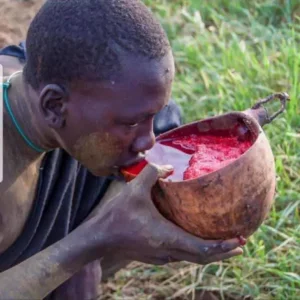As the Karamojong people adapt to modern lifestyles, the treasured traditional practice of consuming a raw blood-milk mixture is slowly phasing out. This unique blend, known as “Ekyalakanu,” has been a staple in their diet for decades, providing them with essential nutrients and sustenance.
The cherished delicacy was obtained from blood after shooting an arrow with utmost precision through the jugular vein of the cow without necessarily killing it. Blood would gush out, and the women would collect it using calabashes, then stir it using special tools until the fibrin separated from the blood. The blood liquid would later be mixed with an equal amount of milk, and the mixture would make a meal for the family. This was done frequently and sometimes on a daily basis during the rainy season.
However, with the increasing influence of outside cultures and the availability of processed food options, the younger generation is gradually veering away from this age-old tradition. Instead, they are opting for more convenient and easily accessible alternatives that align with the changing times.
The introduction of processed foods such as flour (flour, maize, millet, etc.) and the decline in consumption of Ekyalakanu are not only a reflection of changing dietary preferences but also a consequence of the evolving socio-economic landscape in the region. As the Karamojong people embrace modernization and engage with the global market, their traditional practices and customs are inevitably being influenced and reshaped.
Elders in the region have also attributed this reduction to the major decline in the number of livestock in the region and the changing economic landscape that prioritizes other industries over traditional livestock farming. Other problems to do with cattle rustling have caused this decline in livestock.
“Right now, the land is going in the name of investors, all the shrines of the Karimojong are getting destroyed, so I believe that in the next 20 years, there will be no more history about the Karimojong,” said one of the elders.
Mark Lokut, a 70-year-old elder and a Pokot from Loroo Sub County in Amudat district, says that average homesteads used to boast possession of 1000–2000 herds of cattle, which have now dwindled to just a few dozen.
Peter Lopuke, another elder and a resident of Nakapelimoru Sub County in Kotido district, says the appetite for blood eating is still high among the people of Karamoja but because of the loss of animals, they cannot risk the few they have been left with.
Although the government has made efforts to re empower homesteads in the region, through animal distribution, the Karamajong might never recover from this cultural shift. The loss of their herds has not only impacted their livelihoods but also their cultural identity and traditional practices.
The above factors have forced them to adapt and find alternative sources of sustenance, leading to a gradual erosion of their unique cultural heritage. Additionally, the decline in cattle ownership has disrupted the social fabric of the community, as cattle were not only a symbol of wealth but also played a crucial role in social ceremonies and rituals.
